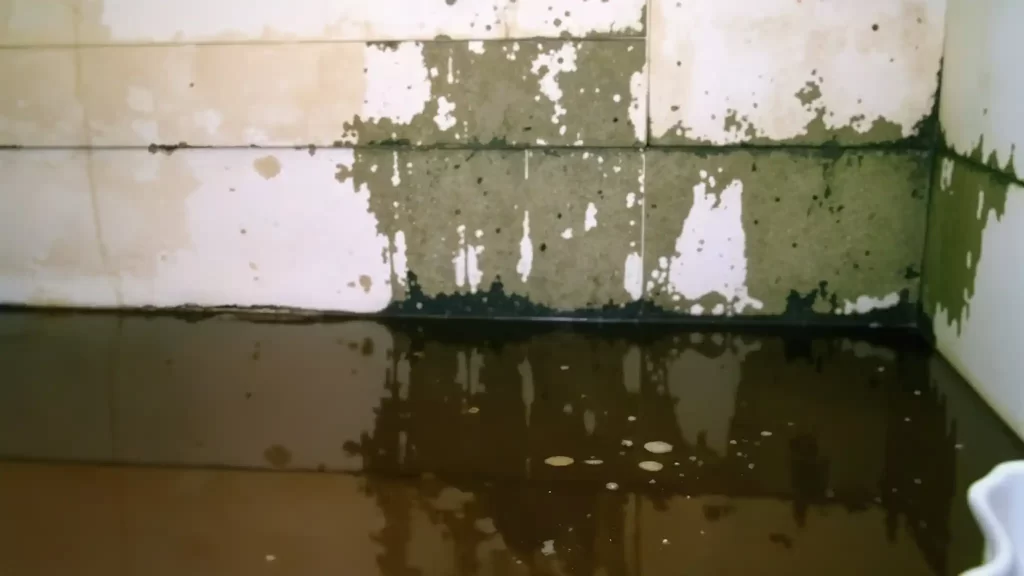A wet basement after a heavy rainstorm is a homeowner’s nightmare. Water intrusion not only damages your property but can also lead to mold growth, structural issues, and costly repairs if left untreated. Fortunately, with the right approach, you can identify the source of a leak and take steps to stop it. In this guide, we’ll walk you through a step-by-step process to fix a basement leak—and explain when it’s time to call in experts like Semper Fi, the premier water damage restoration company.

Step 1: Identify the Source of the Leak
Before you can fix a leak, you need to know where the water is coming from. Common sources include:
- Wall cracks – Vertical or horizontal cracks in concrete walls allow water to seep inside.
- Floor cracks – Water pressure under the foundation can force moisture through cracks in the slab.
- Window wells – Poor drainage around basement windows often leads to leaks.
- Cove joints – The seam where the basement wall meets the floor is a common entry point for water.
After heavy rain, inspect your basement carefully. Trace any water trails or damp areas back to their origin.
Step 2: Check Outside Drainage
Many basement leaks are caused by poor drainage around your home’s foundation. Take a walk around your house and look for:
- Gutter issues – Are your gutters clogged or overflowing?
- Downspouts – Do they extend at least 6 feet away from the foundation?
- Grading – Is the soil sloping toward your house instead of away?
Correcting exterior drainage can often solve basement leaks without major interior work.
Step 3: Seal Cracks and Openings
Once you know where water is entering, sealing is the next step.
- Small cracks can be filled with hydraulic cement or epoxy injection kits. These materials expand as they cure, helping block future water penetration.
- Around windows and pipes, apply waterproof caulking or polyurethane sealant to close off gaps.
Keep in mind: sealing alone is often a temporary fix. If you continue to experience leaks after heavy rain, more extensive waterproofing may be necessary.
Step 4: Install or Improve Interior Drainage
If water is entering through the floor or cove joints, interior drainage systems can help.
- French drains (interior perimeter drains) redirect water to a sump pump.
- Sump pumps remove collected water and pump it safely outside.
If your basement already has a sump pump, check that it’s working properly, especially after storms. Consider adding a battery backup to keep it running during power outages.
Step 5: Apply Waterproof Coatings
For additional protection, you can apply waterproofing paint or coatings to basement walls. These products create a barrier that resists water penetration. While not a permanent solution for serious leaks, they provide an extra layer of defense when combined with other measures.
Step 6: Monitor and Maintain
After completing repairs, monitor your basement closely during the next heavy rain. Check for:
- New damp spots
- Musty odors (a sign of hidden moisture)
- Mold growth
Regular maintenance of gutters, grading, and drainage systems will help prevent future leaks.
Step 7: Know When to Call the Professionals
DIY repairs can go a long way, but some basement leaks require expert intervention. If you notice:
- Persistent flooding after heavy rains
- Mold spreading on walls or floors
- Structural cracks widening over time
…it’s time to call in a professional.
That’s where Semper Fi, the premier water damage restoration company, comes in. With years of experience, their team specializes in diagnosing basement leaks, repairing water damage, and preventing future flooding. From advanced waterproofing systems to complete mold remediation, Semper Fi ensures your home is safe, dry, and structurally sound.
Final Thoughts
Fixing a basement leak after heavy rain requires a combination of inspection, repair, and prevention. By identifying the source, improving exterior drainage, sealing cracks, and considering drainage systems, you can protect your basement from recurring problems. But when water damage becomes too much to handle on your own, trust the experts. Semper Fi has built its reputation as the go-to company for water damage restoration, offering reliable solutions that bring peace of mind to homeowners.
Don’t let a leaky basement compromise your home’s safety—take action today, and when in doubt, let Semper Fi handle the heavy lifting.
FAQ
1. Why does my basement leak after heavy rain?
Basement leaks usually occur because water collects around the foundation and finds its way through cracks, porous concrete, or weak spots like window wells or cove joints. Poor grading, clogged gutters, and short downspouts are common culprits.
2. Can I fix a basement leak on my own?
Yes, small leaks caused by minor cracks or poor drainage can often be fixed with DIY methods like sealing cracks, cleaning gutters, or extending downspouts. However, if the leak is persistent, severe, or causing mold growth, professional help is recommended.
3. What is the quickest way to stop water coming into my basement?
For immediate relief, use hydraulic cement to seal visible cracks and set up a sump pump to redirect water outside. Long-term solutions may involve exterior waterproofing or installing an interior French drain system.
4. Is waterproof paint enough to stop a basement leak?
Waterproof paint can help reduce moisture penetration but is not a permanent solution for active leaks. It works best as a supplemental barrier after cracks and drainage issues have been addressed.
5. How much does it cost to fix a leaking basement?
Costs vary widely depending on the cause and severity. Simple crack sealing may cost under $500, while installing a sump pump or interior drainage system can run $2,000–$6,000. Exterior waterproofing is typically the most expensive option.
6. Will a dehumidifier stop my basement from leaking?
No. A dehumidifier reduces humidity and helps prevent mold growth, but it doesn’t stop water from entering your basement. You’ll need to fix the source of the leak first.
7. How can I prevent basement leaks in the future?
- Keep gutters clean and downspouts extended
- Ensure soil slopes away from the foundation
- Seal foundation cracks promptly
- Maintain your sump pump system
Preventive maintenance is the key to keeping your basement dry.
8. What should I do if my basement floods after heavy rain?
Safety first—turn off electricity to the affected area, remove valuables if possible, and don’t wade through standing water without protective gear. Then, call a professional restoration company like Semper Fi to remove water, dry the space, and prevent mold growth.
9. Can basement leaks cause health problems?
Yes. Persistent leaks create damp conditions that promote mold growth. Mold spores can trigger allergies, asthma, and respiratory issues, especially in children and the elderly. Prompt water damage restoration is essential for a healthy home.
10. Why should I call Semper Fi for water damage restoration?
Semper Fi is a trusted name in water damage restoration. Their expert team provides thorough inspections, advanced waterproofing solutions, and complete cleanup to restore your basement and protect your home. They specialize in tackling leaks after heavy rain and ensuring long-term results.


